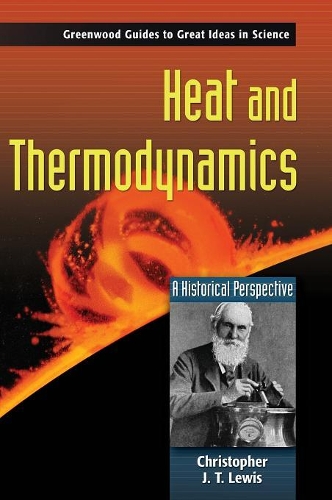
Heat and Thermodynamics: A Historical Perspective
(Hardback)
Publishing Details
Heat and Thermodynamics: A Historical Perspective
By (Author) Christopher J.T Lewis
Bloomsbury Publishing PLC
Greenwood Press
30th August 2007
United States
Classifications
General
Non Fiction
536
Winner of Outstanding Academic Title 2009 2007 (United States)
Physical Properties
Hardback
224
Description
Heat and energy form the backbone of modern physics, but the ideas are not intuitive for most students beginning their study of physics. Instructors spend much valuable time in the classroom and lab explaining such concepts as entropy, thermodynamics, and the conservation of energy. But, as educators know, such ideas can become clearer if students learn how the scientists who developed these concepts came to their discoveries through experimentation and observation. This volume in the Greenwood Guide to Great Ideas in Science series provides a historical perspective to heat and thermodynamics, providing readers with an accessible introduction to the people whose work led to our profound understanding of the nature of the universe. Originally stimulated by the invention of the steam engine during the Industrial Revolution, thermodynamics developed into a universally applicable and powerful scientific theory. Heat and Thermodynamics includes illustrations, a bibliography, timeline, and glossary for students who wish to research the subject in more detail.
Reviews
Lewis offers a great anthology of thermodynamics, which has become a cornerstone in every branch of physical science and engineering. The author is highly praised for articulating the history of thermodynamics, which started as a random empirical endeavor across the continents to become one of the pillars of science on a strong mathematical foundation. This book is not only enlightening to those who thirst for knowledge, but also essential to today's generation of students who may view thermodynamics as an unfathomable science in the age of iPods. The reader will appreciate the great, strenuous effort toward the understanding of basic concepts such as heat, cold, and temperature, which emerge today as simple concepts of second nature. The reader will hold in the highest regard the contributions of Carnot, Joules, Maxwell, Boltzmann, Gibbs, and many other scientists who laid the foundation of thermodynamics with remarkable innovation and tenacity. Recommended as a general education course in all curricula as humankind strives toward energy conservation and protection of the environment. Highly recommended. All levels. * Choice *
. . . a quick and readable synopsis of the field's major ideas and how they were developed and tested. A public library, high school, or university with an active History of Science program might find the volume (and the rest of the series) attractive. * ARBA *
Author Bio
Christopher J. T. Lewis teaches the history of science at the University of Cambridge. He studied natural science at Cambridge and the history of science at Imperial College, London. He has held research fellowships at the Warburg Institute, University of London, and the University of Padua in Italy. During the 1980s and 1990s, he worked as a tutor and lecturer in science and mathematics and the history of science, mathematics, and technology for the Open University.
